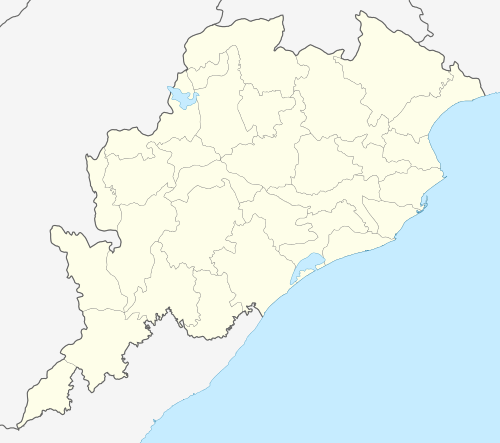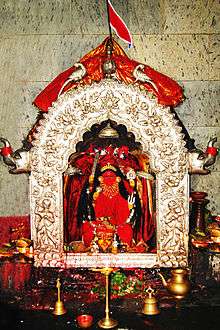Chausathi Jogini Temple
| Chausathi Jogini Temple | |
|---|---|
|
Chausathi Jogini Temple, Hirapur | |
 Chausathi Jogini Temple Location within Odisha | |
| Name | |
| Other names | Yogini Mandir |
| Oriya | ୬୪ ଯୋଗିନୀ ମନ୍ଦିର୍ |
| Geography | |
| Coordinates | 20°13′35.454″N 85°52′32.141″E / 20.22651500°N 85.87559472°ECoordinates: 20°13′35.454″N 85°52′32.141″E / 20.22651500°N 85.87559472°E |
| Country |
|
| State/province | Odisha |
| District | Khurda |
| Locale | Hirapur |
| Elevation | 17 m (56 ft) |
| Culture | |
| Primary deity | Kali |
| Important festivals | Kali Puja |
| Architecture | |
| Architectural styles | Hypaethral |
| Number of temples | 2 |
| Number of monuments | 3 |
Chausath Jogini Mandir (64 Joginis Temple) is situated in a hamlet called Hirapur,[1] 20 km outside Bhubaneswar, the capital of Odisha state of Eastern India.
The temple is believed to be built by the Queen Hiradevi of Bramha dynasty during 9th century.[2]
It's built in a circular fashion, completely put together with blocks of sand stone. The inside of the circular wall has cavities, each housing the statue of a Goddess. There are around 56 such idols, made of black granite, inscribed within the wall cavities, centring on the main idol which is the Goddess Kali, who stands on a human head representing the triumph of the heart over the mind. The temple houses a central altar (Chandi Mandapa) which has the remaining 8 Goddess idols on all 4 sides. Some historians believe that an idol of Maha Bhairava was worshiped in the Chandi Mandapa.[2]
64 Joginis Temple is a tantric temple,[3] with hypaethral architecture as tantric prayer rituals involve worshiping the bhumandala (environment consisting all the 5 elements of nature - fire, water, earth, sky and ether).
The legend behind the temple according to local priests is of the Goddess Durga taking the form of 64 demi-goddesses in order to defeat a demon. After the fight the 64 goddesses (Joginis) asked Durga to commemorate them in the form of a temple structure.
The Jogini idols are generally representing a female figurine standing on an animal, a demon or a human head depicting the victory of Shakti (Feminine power). The idols express everything from rage, sadness, pleasure, joy, desire and happiness.
Such temples are also seen at Ranipur-Jharial site of the Balangir district in Odisha and seven other places in India.
The number 64 finds its reference in Hindu mythology in various forms viz Kālá for time, Kalā for performing arts etc. The temple complex is maintained by Archaeological Survey of India.
See also
References
- ↑ "Orissa Review, Government Gazette". Orissa Review. Home Department, Government of Orissa. 43: 30. 1986.
- 1 2 Saravanan, V. Hari (2014). Gods, Heroes and their Story Tellers: Intangible cultural heritage of South India. Notion Press. ISBN 9384391492.
- ↑ "Yogini temple of Hirapur". The Hindu. 17 Oct 2003.
Gallery
-
The Jogini idols
-
Yoginis in a circular format
External links
-
 Media related to Chausath Yogini Temple Hirapur at Wikimedia Commons
Media related to Chausath Yogini Temple Hirapur at Wikimedia Commons
